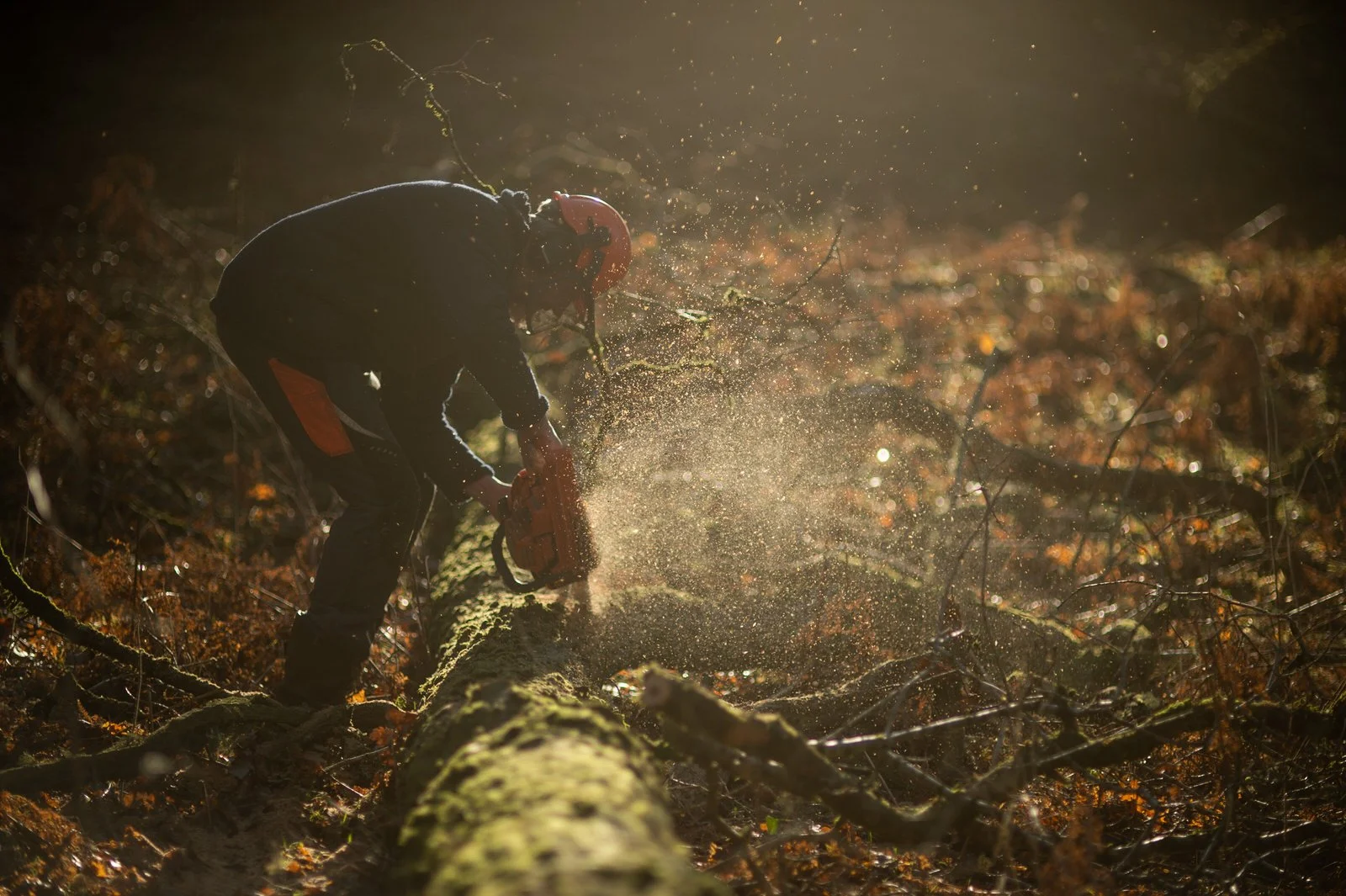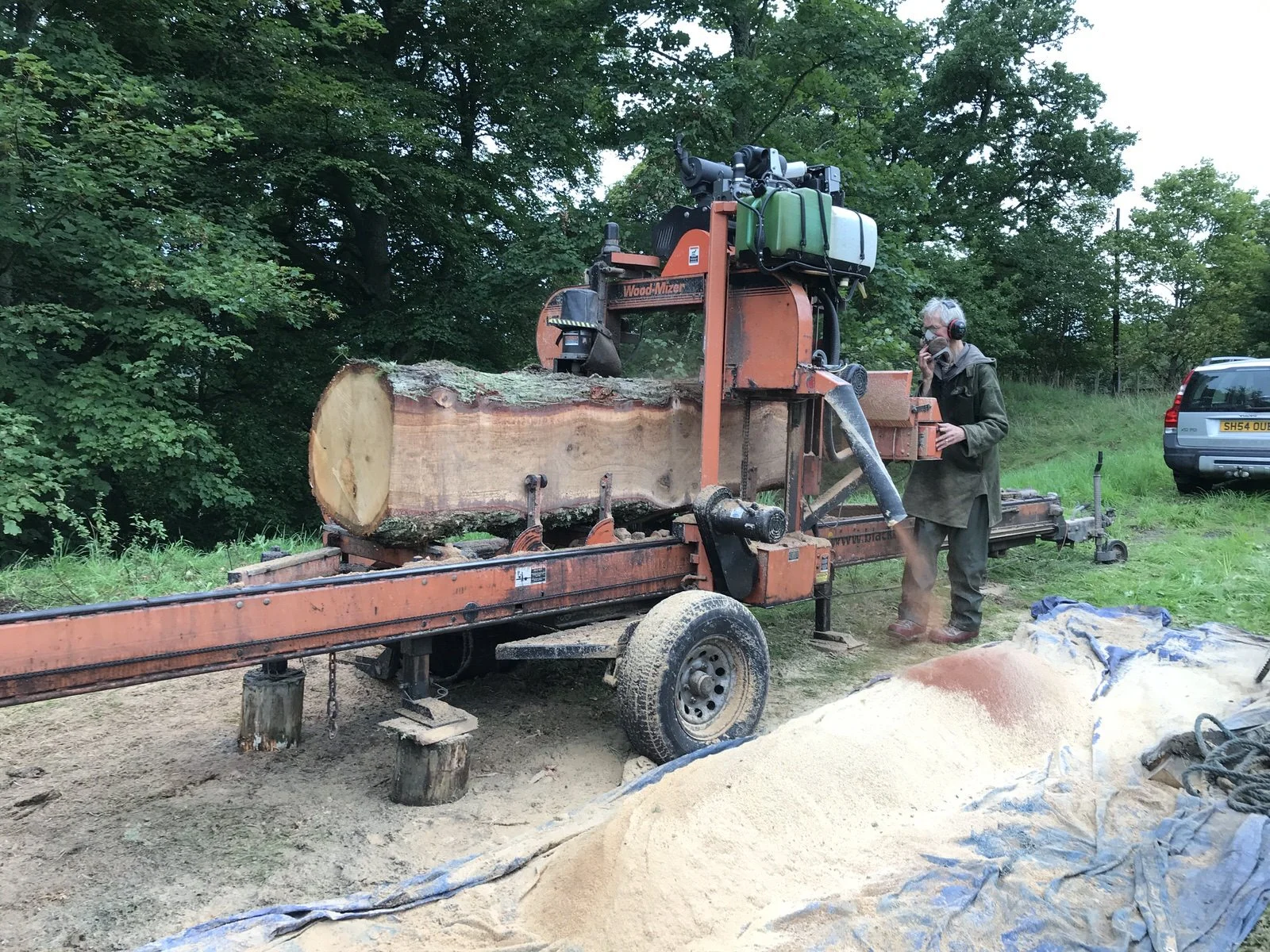
Angus and Lorna are part of a collective who sensitively and care for a fifty-acre bluebell wood a few miles downstream from their workshop. Old Castle Wood is a mixture of previously coppiced oak with an understory of bluebells, copses of birch and hazel, small fields of bracken that were browsed by Highland cattle, a damp alder wood with marsh marigolds, and a small section of beech. This unique parcel of land is bounded by the River Tay and a de-commissioned railway line, and narrowly escaped being clear-felled for commercial soft wood forestry.
“There is respect for wood. A respect that acknowledges the years laid out in growth rings from these living giants that drank the sun for so many years, that stood here in the heart of Scotland while the mist brushed them, snow swirled and eddied among their limbs, and the first sap rose each spring with the bluebells at their base. Angus gives them the time and attention they deserve. He knows these trees, cares for them, and when the time is right he works them into forms that will last, even beyond their rooted years.”
— Jon Plunkett
The trees we fell are not commercial grade timber. We take out the smaller, more bent and gnarly trees and over time we have learned to use this wood for fine furniture making. We embrace the knots and stains, characterful grain, and dark honey-coloured wood.
Being close to our source material, learning about sustainable forestry, and doing our own felling and milling stimulated experimentation in our furniture making practice - specifically with steam-bending. Old Castle Wood oak is steambent for products found in our shop.
We spend time enjoying the wood: walking, looking, listening, drinking the spring water, camping, gathering and sometimes working. We selectively fell a few trees to allow more light onto the woodland floor, increasing bio-diversity and facilitating natural regeneration. Each tree taken is carefully considered and they are not the ‘best’ trees: the tallest, or the straightest. Quite the opposite, and our thinning improves the long-term health and resilience of the woodland and the quality of future timber.
Read more on why we fells trees.
See Grand Tours of Scotland’s Rivers - link is to a thirty minute programme by Paul Murton on the Upper River Tay and featuring Angus, the workshop and woodland - we appear after 20 mins.
Other woodland work includes protecting natural regeneration of trees, harvesting acorns and bluebell seed under license. Our bluebell seeds, crab apple seeds and acorns are in the Millennium Seed Bank at Royal Botanic Gardens Kew in London. We control invasive non-natives, improve paths and work in harmony with the seasonal rhythms of birds, bats and trees.
We are also offered wood by local foresters, tree surgeons, saw-millers and estates in Perthshire. Across the UK our scarce patches of native woodland (such as oak and ash) are mostly neglected as managing native trees is time-consuming and highly skilled work. By using local native wood for furniture making, we provide a market for this valuable work, and contribute to a vital local, sustainable, circular economy.
Most of our timber now comes from a twenty mile radius of our workshop.
We were offered a pair of large oak trees by a nearby farm, called The Dalcapon Oaks and they were milled by Pol Bergius in 2020 (see below). This wood was stacked, air-dried and kiln-dried before being used for a special limited and numbered edition of Dalcapon Frame Rockers and a special, limited edition of Dalerb Garden Furniture for RHS Chelsea Shower Show 2023. Angus is often on-site for the milling and helps to assess the straightness of the grain and the character of the wood, to determine the best thickness of planks for our future steam-bending and cabinet making. We are currently using Storm Arwen windblown trees from Glenlyon Estate. We milled these trees with Pol Bergius and air-dried them in our yard in Aberfeldy.
“Working Woods” are happier healthier woods. We are members of the Association of Scottish Hardwood Sawmillers (ASHS) and licensees of the Working Woods label: a guarantee that our timber is local, ethical and sustainable. https://www.ashs.co.uk








